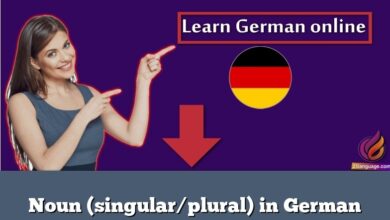Learn german online
-

Regular Verb (present) in German
Regular Verb (present) in German.In German, regular verbs follow a consistent pattern in their conjugation in the present tense. Here’s…
Read More » -

Noun (singular/plural) in German
Noun (singular/plural) in German.Here’s a table showing examples of nouns in both singular and plural forms in German, along with…
Read More » -

Basic Sentence Structure in German
Basic Sentence Structure in Germa.Certainly! Here’s an explanation of basic sentence structure in German, along with its English translation. German…
Read More » -

Reflexive Verbs in German
Reflexive Verbs in German.Reflexive verbs in German are verbs where the action of the verb is reflected back onto the…
Read More » -

Negation in German
Negation in German.Negation in German typically involves the use of the word “nicht” (not) or “kein” (no/none). The choice between…
Read More » -

Imperative in German
Imperative in German.The imperative in German is used to give commands or instructions. It’s an essential part of the language,…
Read More » -

Conjunctions in German
Conjunctions in German.Here’s a table of some common German conjunctions along with their English translations. This should be helpful in…
Read More » -

Adjectives and Verbs in German
Adjectives and Verbs in German.Certainly! Below are tables listing some common adjectives and verbs in German along with their English…
Read More » -

Moods in German
Moods in German.In German grammar, “moods” refer to different forms of verbs that express the manner in which the action…
Read More » -

Nouns and Pronouns in Grman
Nouns and Pronouns in Grman.Certainly! Below is a table listing some common nouns and pronouns in German along with their…
Read More » -

Questions and Answers in German
Questions and Answers in German.Here’s a table of common German questions and answers, along with their English translations: Question in…
Read More » -

Negation in German
Negation in German.Negation in German is typically expressed using the word “nicht” (not) or “kein” (no, none). The choice between…
Read More » -

Declension in German
Declension in German.refers to the way nouns, pronouns, articles, and adjectives change their form based on number (singular or plural),…
Read More » -

Subordinate Clauses in German
Subordinate Clauses in German.Subordinate clauses in German, known as “Nebensätze,” are clauses that cannot stand alone as complete sentences and…
Read More » -

Modal Verbs in German
Modal Verbs in German are special verbs that modify the meaning of other verbs. They express abilities, possibilities, permissions, or obligations.…
Read More »